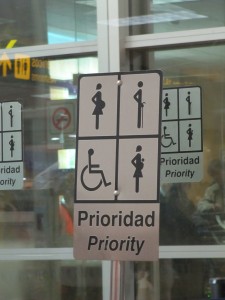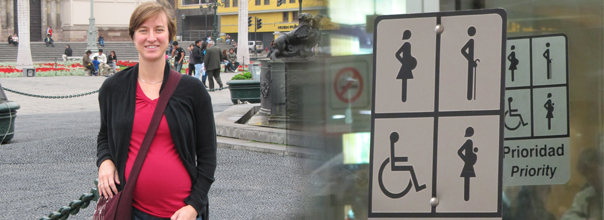By Stacie Dunkle
“We don’t recommend international travel during pregnancy for first-time mothers,” said my nurse midwife. Those words stopped me in my tracks. As an officer in the Epidemic Intelligence Service with three years of experience working overseas, I couldn’t believe what this nurse was telling me. Rarely a month went by that I wasn’t waiting in a security line at the airport. “Why?” I asked. I was up-to-date on all of my vaccines, even yellow fever, which I knew shouldn’t be given during pregnancy, and I was well-practiced in methods for staying healthy in developing countries (wearing seatbelts and avoiding untreated drinking water, food from street vendors, raw vegetables, etc.). I began to wonder how I was going to break the news to my supervisor that I wouldn’t be able to conduct the investigation we were planning in Nepal in two weeks. We had been preparing for over a month. Our colleagues on the ground were ready to go, and my plane tickets were already booked.
Reality Check
When my partner and I decided to have a baby, I knew that once our little one arrived, my life would change dramatically. There would be no more hopping on planes to far-off places during public health emergencies—I’d have to think about who would watch my baby and how I’d cope with potentially missing all those precious moments with him. Still, the decision was easy since I had always wanted to have children and I was finally at a point in life when the timing felt right. Pregnancy can be a difficult thing to plan, of course, so when it did happen, somehow it still felt unexpected. Even more unexpected was how much my life was suddenly changing before the baby had even arrived.
 My trip to Nepal was planned toward the end of my first trimester and I hadn’t yet broken the happy news to my supervisor, since you never know what might happen during those first few months. Luckily my symptoms up to that point were limited to mild morning sickness and fatigue. When the nurse explained that the region in Nepal I was planning to visit was endemic for chloroquine-resistant malaria and plopped CDC’s Health Information for International Travel (aka the “Yellow Book”) down in my lap, I realized it was time to share my secret.
My trip to Nepal was planned toward the end of my first trimester and I hadn’t yet broken the happy news to my supervisor, since you never know what might happen during those first few months. Luckily my symptoms up to that point were limited to mild morning sickness and fatigue. When the nurse explained that the region in Nepal I was planning to visit was endemic for chloroquine-resistant malaria and plopped CDC’s Health Information for International Travel (aka the “Yellow Book”) down in my lap, I realized it was time to share my secret.
“You’ll be taking a big risk,” the nurse said. “You can’t take any of the drugs we usually prescribe to prevent malaria.” Although most pregnant women can take a drug called mefloquine to prevent malaria, I couldn’t take it because of my personal health history. I wasn’t just thinking about myself anymore; I also had to consider my baby. Because of the serious risk associated with getting malaria during pregnancy, I decided it was best to cancel my trip.
Of course, my supervisor was very understanding. He had been planning to travel to Nepal as well, and with his guidance, our partners were able to carry out the investigation on their own. Although I was disappointed to not participate fully, I changed my focus to health issues that were closer to home and still traveled quite a bit. During my second trimester, I flew to Mexico, Ohio, Michigan, Canada, Arizona, and Florida. It’s too bad I couldn’t get double the frequent flyer miles while traveling for two! During these flights, I avoided lifting heavy baggage, always requested an aisle seat, and was careful to drink plenty of fluids and walk around every 30 minutes or so. Of course, the latter was no problem since I had to use the restroom that often anyway! I enjoyed traveling while pregnant and laughed thinking that my baby would be born already familiar with the sound of jet engines and having memorized the safety features aboard aircrafts.
The Home Stretch
When my third trimester arrived, I was offered an opportunity to travel to Lima, Peru to attend a training summit. It would be a valuable trip for me professionally because it would provide background for a project I was working on. I would be able to network with colleagues and focus my work to make it more useful to them. When I looked at the dates for the trip, I realized I would be 33 weeks pregnant upon departure and staying for a little over a week. I hesitated because many physicians don’t recommend traveling after 32 weeks, and most airlines restrict travel after 36 weeks for single, uncomplicated pregnancies. I was fortunate to have been very healthy during pregnancy and decided the trip was worth the risk, but swore I would cancel if any concerns came up before departure.
I still took a number of precautions before I committed to traveling. These included getting approval from my certified nurse midwife and reviewing CDC’s website of “Health Information for Travelers to Peru.” My biggest concern was premature delivery in an unfamiliar country where Spanish is the primary language. My experience with Spanish is limited to high school classes and a few weeks traveling in Spain and Mexico. If I had to ask anything more than, “Dónde están los baños?” I would be out of luck; that included trying to describe symptoms I might be experiencing to a doctor. Fortunately, I have a friend who had just recently moved back to the US after living in Lima for a year. She was able to provide local English-speaking contacts and recommended an obstetrician and hospital where I could receive care. I also checked to make sure my health insurance would cover any medical expenses I might have had while travelling.
 The trip to Lima was relatively uneventful with regards to my health. I was more nervous and uncomfortable than I had expected to be, though. My feet were swollen, and the fatigue from my first trimester returned with a vengeance. I did my best to keep up with the demands of work and getting to know as many people as I could. Peruvians are much more considerate of pregnant women than we are here in America. During a city tour, I saw a sign for a pregnant lady parking spot and at the airport, as we were waiting in line to check in, one of the airline staff asked me if I wanted a wheelchair. Initially, I was embarrassed and refused, but after standing and waiting with my luggage for nearly an hour, I longed for the wheelchair. We took an overnight flight home, and as I paced up and down the aisle with swollen legs, unable to get any sleep while most of the other passengers snoozed away, I couldn’t wait to get home. Finally stepping off the plane was a huge relief.
The trip to Lima was relatively uneventful with regards to my health. I was more nervous and uncomfortable than I had expected to be, though. My feet were swollen, and the fatigue from my first trimester returned with a vengeance. I did my best to keep up with the demands of work and getting to know as many people as I could. Peruvians are much more considerate of pregnant women than we are here in America. During a city tour, I saw a sign for a pregnant lady parking spot and at the airport, as we were waiting in line to check in, one of the airline staff asked me if I wanted a wheelchair. Initially, I was embarrassed and refused, but after standing and waiting with my luggage for nearly an hour, I longed for the wheelchair. We took an overnight flight home, and as I paced up and down the aisle with swollen legs, unable to get any sleep while most of the other passengers snoozed away, I couldn’t wait to get home. Finally stepping off the plane was a huge relief.
To everyone’s surprise, I went into labor six days later. My mind raced with questions. Will my baby be healthy arriving at 35 weeks? What would have happened if I had gone into labor in Peru without the support of my loved ones? After reviewing my medical records, my midwife predicted that my due date was off by at least a week and I was closer to full term than we had originally thought. My son was born the following night, completely healthy, into the loving arms of his mother, father, and grandparents. The question I kept asking myself was: if I had it to do again, would I have travelled so far knowing I was so close to delivery?
 Although the trip had a number of professional benefits, I probably would do things differently. As I had known from the beginning, my life changed dramatically after having children. The first change I observed in myself as a new parent was that my tolerance for risk went down the moment I looked into my son’s eyes. International travel is risky at any point during pregnancy, since both travel and pregnancy can be unpredictable. Although CDC and health care providers can provide knowledge, guidance, and recommendations, it is up to each mother to balance the benefits and risks and decide what is best for herself and her child.
Although the trip had a number of professional benefits, I probably would do things differently. As I had known from the beginning, my life changed dramatically after having children. The first change I observed in myself as a new parent was that my tolerance for risk went down the moment I looked into my son’s eyes. International travel is risky at any point during pregnancy, since both travel and pregnancy can be unpredictable. Although CDC and health care providers can provide knowledge, guidance, and recommendations, it is up to each mother to balance the benefits and risks and decide what is best for herself and her child.
What do you think?
We want to hear from you. Have you traveled during pregnancy or had to pass on a trip because you were expecting? How has being a parent changed your career?
If you would like more information on traveling during pregnancy please visit http://wwwnc.cdc.gov/travel/yellowbook/2012/chapter-8-advising-travelers-with-specific-needs/pregnant-travelers.htm



Public Comments
Comments listed below are posted by individuals not associated with CDC, unless otherwise stated. These comments do not represent the official views of CDC, and CDC does not guarantee that any information posted by individuals on this blog is correct, and disclaims any liability for any loss or damage resulting from reliance on any such information. Read more about our comment policy ».
December 15, 2011 at 4:53 pm ET - Jennie
I was a little over 20 weeks pregnant with our first. We lived in Seoul, South Korea at the time. We were coming back to the states to visit for Christmas vacation. I was less then enthused about enduring a long 20 hour travel time haul to Boston.
I have to say, we flew on Korean Air and it was a wonderfu! From my experience the flight crew on international airlines take great care of their passengers, especially the pregnant women!
Link to this comment
December 15, 2011 at 8:47 pm ET - alana29
Do you regret missing overseas opportunities and wish you had gotten pregnant after EIS?
Link to this comment
AUTHOR COMMENT December 16, 2011 at 10:51 am ET - Blog Administrator
(From Author Stacie Dunkle) Not at all. EIS is about developing skills to respond to disease outbreaks that occur both here in the US as well as internationally. It’s very important to me to have a balance of career and family. Thank you for your question!
Link to this comment
December 18, 2011 at 5:17 pm ET - Glyn Griffiths
We are currently a year into a journey the length of the Andes from Ushuaia to the the north of Colombia, and my wife became pregnant in Peru. We are frustrated by the lack of coherent advice available. Apart from the not at all helpful ‘Don’t go if you are pregnant’ which you encountered, we have read widely differing reports of risk levels in Colombia. Advice as to the safe altitudes varies from ‘anything above 800m to >1700m. The British seem to have Colombia as low risk for chloroquine resistant malaria anywhere outside the Amazon. The WHO have high risk areas in the Amazon AND along the pacific coast with particular pockets of danger near Panama and Venezuela. As we are travelling by vehicle the oft trotted out advice that you are safe in all cities is of no comfort to us as we have to drive between them through rural areas.
Another dilemma is what anti-malarials are safe in pregnancy. Mixed reports on Mefloquine although the CDC have just come out saying it’s safe (reflecting new FDA guidelines) despite reports of teratogenicity in rats. We tried the top three hospitals in Quito and none had anything but chloroquine despite Ecuador also having choloroquine resistant malaria. The official line from all of them is denial…that there is no malaria in Ecuador. We’re finding the same thing in Colombia…”As long as you don’t go to the jungle there’s no malaria here. Just use DEET (also contraindicated in pregnancy) and wear long sleeves and don’t go out after dusk”. My experience of the tropics is that determined mosquitoes are rarely put off by repellents for long.
If we can find mefloquine we’ll take it but we have major concerns. Data may show that there is little chance of teratogenicity or increased risk of still birth but it is well known for serious neurological side effects such as anxiety and depression and it does cross the placenta. So what affect does it have on a developing brain? No one knows. We have also read that chloroquine along with proguanil might be a safe alternative although proguanil suppresses folic acid so the advice is to take 5mg Folic acid a day which is basically an entire packet at the dosage strengths available here! It may be a blind alley anyway as we haven’t seen proguanil on sale here yet.
We are also facing up to the fact that we may also have to alter our plans due to lack of clear guidance and safeguards.
On the plus side Echo scans are very easy to get here and in these days of internet getting hold of literature on pregnancy has been no problem. Nutrition has been an problematic issue. Fruit is plentiful here which is great but salads are hard to find and even when they are they might have been washed in unsafe water. Concerns about picking up food poisoning are ramped up considerably since we knew about the pregnancy. Any further advice you can send our way would be greatly appreciated.
Sincerely
Glyn Griffiths
Link to this comment
December 30, 2011 at 2:29 pm ET - Peggy Oba
I felt I had to be exra careful because I was an older mom. Absolutely no risk taking for me because this might have been my last chance to be a mother.
I was also lucky to be married to a man who felt I should be an at-home mom. We gave up a lot of economic advantages but we have felt it was well worth it over the years. I have worked at home on Fetal Alcohol Syndrome information retrieval for the past 15 years.
Please do not drink before, during or after your pregnancy if you are nursing. The behavioral problems caused by prenatal alcohol exposure are not worth the risk.
Link to this comment
February 29, 2012 at 10:39 am ET - susi
I think you made a good decision by cancelling your trip due to risks in the destination country.
After reading your experience I’m more in a dilema than I was before. I have a planned trip since last year to the US. It will be the end of this March and my pregnancy will come to week 11. Everything is set, ticket bought, accomodation paid and seminar fee also paid (I will attend a week seminar). My concerns are related to long travel (22hours from my country, Indonesia) and how expensive it would be in the US if anything happens.
This is my first pregnancy aswell and I’m 36-year old mother to be. I don’t want to risk it…but I’m still torn in two..go or not.
Link to this comment
AUTHOR COMMENT May 4, 2012 at 9:43 am ET - Blog Administrator
@Peggy Oba: Thanks a lot for your comments and wise words.
Link to this comment
September 24, 2012 at 12:35 pm ET - Undecided
This is a helpful story. I will be three months pregnant and am planning to travel to Galapagos and Peru with my partner and two year old. These are work trips and I really want to go, but still trying to weigh the risks. I had a normal pregnancy with my son but am considered high-risk because I am 38.
Link to this comment